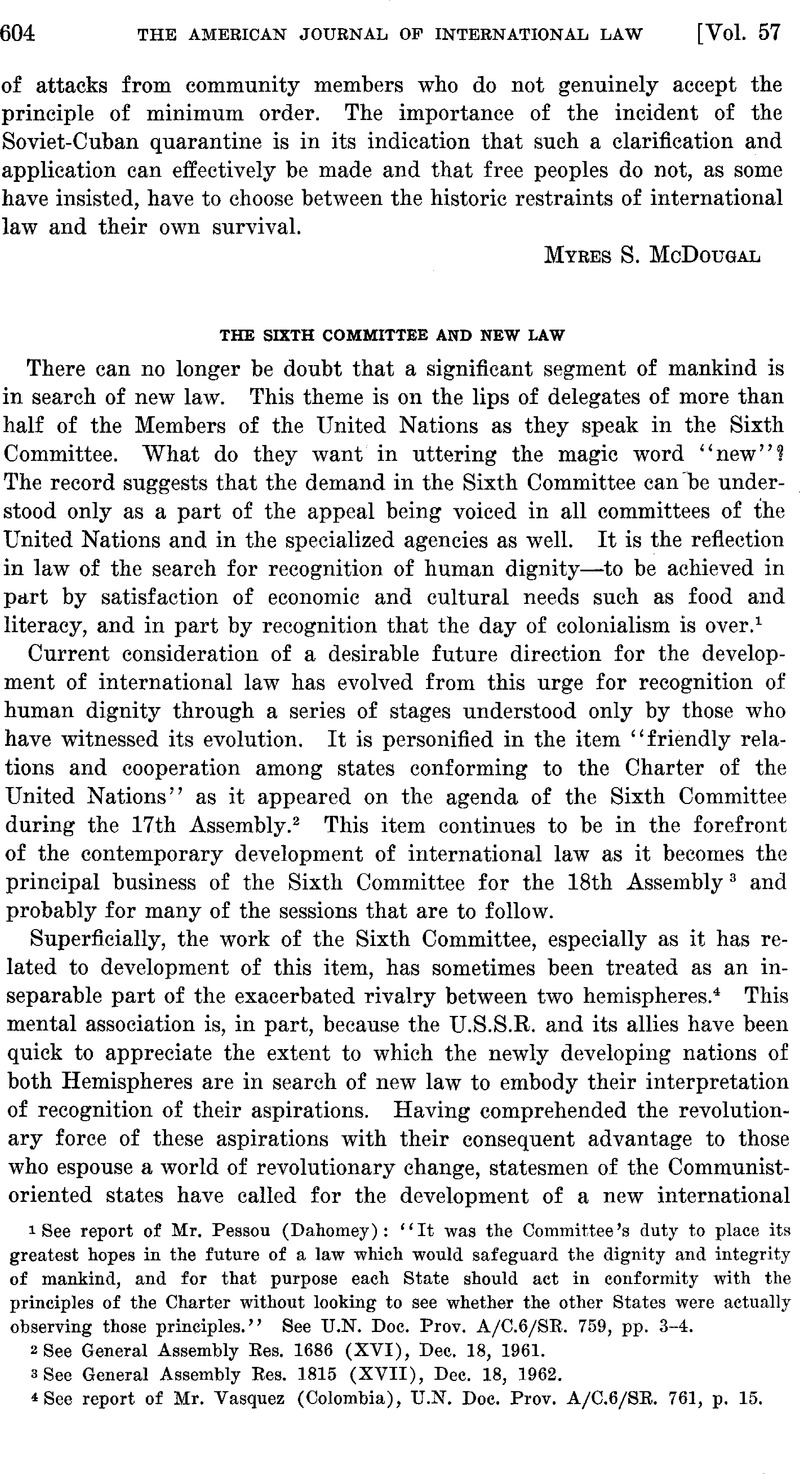Article contents
The Sixth Committee and New Law
Published online by Cambridge University Press: 28 March 2017
Abstract

- Type
- Editorial Comment
- Information
- Copyright
- Copyright © American Society of International Law 1963
References
1 See report of Mr. Pessou (Dahomey): “ I t was the Committee's duty to place its greatest hopes in the future of a law which would safeguard the dignity and integrity of mankind, and for that purpose each State should act in conformity with the principles of the Charter without looking to see whether the other States were actually observing those principles.” See TJ.N. Doc. Prov. A/C.6/SE. 759, pp. 3-4.
2 See General Assembly Res. 1686 (XVI), Dec. 18, 1961.
3 See General Assembly Ees. 1815 (XVII), Dec. 18, 1962.
4 See report of Mr. Vasquez (Colombia), TJ.N. Doc. Prov. A/C.6/SE. 761, p. 15.
5 See report of Mr. Pechota (Czechoslovakia), ibid., SB. 753, p. 7.
6 For a history of the emergence of the concept of peaceful co-existence in international law, see Me. Henri Cochaux, “Aspects Juridiques de la Coexistence,” InternationalLaw Association, Report of the Forty-Eighth Conference, New York, 1958, pp. 468-484. For a review of the problems of the Sixth Committee as they appeared in the spring of 1962, see 1962 Proceedings, American Society of International Law 89-114.
7 See Program of the Communist Party of the Soviet Union, 1961, Pt. I, Ch. 8.
8 See report of Mr. Quintero (Panama): “The ideal of ‘peaceful coexistence’, which seemed to be the central point of the draft resolution [presented by Czechoslovakia] aroused the distrust of many countries, not because those words were improper or expressed an idea which was reprehensible in itself, but because the circumstances surrounding the birth of that slogan had rendered it suspect to many.” U.N. Doc. Prov. A/C.6/SR. 760, p. 8.
9 See report of Mr. Morozov (U.S.S.E.), ibid., SB. 764, pp. 13-14.
10 See U.N. Voe. A/C.6/L. 509, Nov. 21, 1962.
11 See U.N. Doc. cited note 3above.
12 See report of Mr. Zoukir (Tunisia), U.N. Doc. Prov. A/C.6/SR. 775, p. 3.
13 See report of Mr. Jusuf (Indonesia). General Assembly, 16th Sess., Official Eecords,6th Committee, Legal Questions, Summary Records of Meetings, Sept. 20-Dec. 15,1961 (New York, United Nations, 1962) p. 71 (SR. 702, par. 25).
14 See ibid.
15 See report of Mr. Miskra (India), U.N. Doc. Prov. A/C.6/SR. 770, p. 2.
16 See report of Mr. Bernstein (Chile), ibid., p. 10.
17 See report of Mr. Sunobe (Japan), ibid., SB. 754, p. 3.
18 See report of Mr. Zoukir (Tunisia), ibid., p. 5.
19 See report of Mr. Collier (Sierra Leone), ibid., SR. 756, p. 3.
20 See report of Mr. Quissofies (Guatemala), ibid., p. 14.
21 See report of Mr. Moreno (Mexico), ibid., SB. 758, p. 11.
22 See report of Mr. Pessou (Dahomey), ibid., SR. 759, p p . 3-4.
23 See report of Mr. Sucharitkul (Thailand), ibid., SR. 763, p. 8.
24 Afghanistan also shared this view. See report of Mr. Tabibi (Afghanistan),ibid., SR. 762, p. 8.
25 See report of Mr. Herndl (Austria), ibid., SR. 766, p. 4.
26 See report of Mr. Saario (Finland), ibid., SR. 765, p. 18.
27 See report of Mr. Iqbal (Pakistan), ibid., SR. 761, p. 3; also report of Mr. Anoma (Ivory Coast), ibid., SR. 762, p. 18, and report of Mr. Mirfenderskiki (Iran), ibid., p. 14.
28 See report of Mr. Rosenne ( Israel ) , ibid., SR. 767, p . 14.
29 See report of Mr. Vazquez (Colombia), ibid., SR. 761, p . 16.
30 See report of Mr. Tabibi (Afghanistan), Hid., SE. 762, p. 8.
31 See report of Mr. Jimenez (Philippines), ibid., p. 16.
- 1
- Cited by




